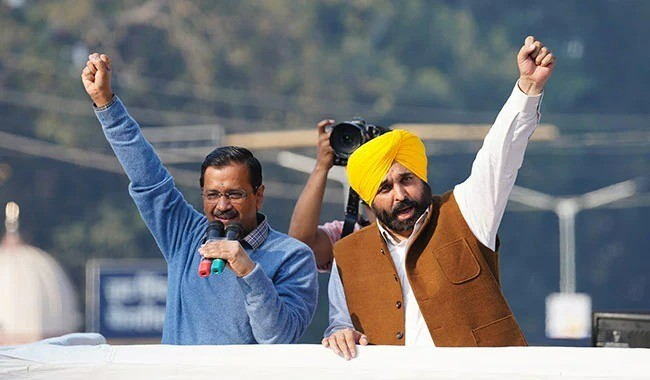That there was a wave working in favour of AAP is evident from the fact that political bigwigs like Charanjit Singh Channi, Captain Amarinder Singh, Navjot Singh Siddhu, Sukhbir Singh Badal, Prakash Singh Badal and many others could not win the high-octane battle of Punjab.

New Delhi: The landslide victory of Aam Aadmi Party (AAP) in the bordering state Punjab may have been triggered by a lot of factors such as a “successful” Delhi model, Congress infighting, anti-incumbency and a multi-layered campaign strategy.
That there was a wave working in favour of AAP is evident from the fact that political bigwigs like Charanjit Singh Channi, Captain Amarinder Singh, Navjot Singh Siddhu, Sukhbir Singh Badal, Prakash Singh Badal and many others could not win the high-octane battle of Punjab.
Here’s a look at what may have worked for Punjab:
A ‘Successful’ Delhi Model
The Arvind Kejriwal-led AAP successfully rode on its ‘Delhi Model’ in Punjab with a focus on popular schemes and freebies, governance at the doorsteps of the beneficiaries, focus on health infrastructure, quality education and a strong and decisive government.
The party successfully convinced the voters of Punjab that it will not only provide free and subsidised water, electricity and other services but will also ensure cheaper health and education services. With these factors, the AAP connected voters of the state and snatched 92 of the 117 seats by decimating the well-settled political parties. In other terms, the party got 42.01% vote share, 17% higher than what it got in the 2017 election.
Also Read: Punjab Assembly poll results: AAP sweeps state election, decimates Congress bastions
Internal Rift Within Congress
The rift between the leaders of Congress was in the open. What initially started between Navjot Singh Sidhu and Amarinder Singh, continued between Sidhu and Charanjit Singh Channi after the latter replaced Singh.
The central leadership had asked Harish Rawat to rush to ease out the tension by ignoring other national level leaders from Punjab but its effort went down the drain. Infighting withing the party and display of undisciplined and indecent behaviour by its leaders helped AAP to grow in the state where Congress, at one point of time, was in a comfortable position.
Anti-Incumbency
In Punjab, anti-incumbency has always worked as a major reason for parties failing to retain to power. This time too, the anti-incumbency worked against the ruling Congress and went in favour of AAP. The people of the state were not happy with the policies of the Captain Amarinder Singh-led Congress government which was in power for 4.5 years and even those enforced by Channi. Hours after the defeat, Congress General Secretary Randeep Surjewala said the Congress could not overcome the anti-incumbency of the 4.5 years under Singh. However, corruption charges were raised even against Channi’s relatives and caused a damage to his government which reflected during the election campaign.
Multi-Layered Campaign Strategy
Although the AAP has a strong voice in the form of its national convenor and Delhi Chief Minister Arvind Kejriwal, its grassroot workers played a strong role during the election campaigns and even in laying out the party’s foundation. Junior party workers targeted every household to convince them in the favour of the party followed by mid-level party workers, who visited the same households again. Meanwhile, senior party functionaries kept a close tab on the feedback received from every visit and then strategised its campaign.
In the 117-member Assembly, a party needs to get 59 seats to form the government. The Congress won 18 seats, showing the ruling outfit’s poor performance. Meanwhile, the Shiromani Akali Dal won three seats, it’s ally Bahujan Samaj Party (BSP) won one and the BJP won two seats and one seat went to an Independent candidate.
In a tweet, Prime Minister Narendra Modi said, “I would like to congratulate AAP for their victory in the Punjab elections. I assure all possible support from the Centre for Punjab’s welfare.”
Addressing supporters in Delhi, Arvind Kejriwal said, “The aam aadmi (common man) has defeated Charanjit Singh Channi, Navjot Sidhu, Amarinder Singh, Bikram Majithia. Don’t upset the common man, or even the most powerful will be shown the door.” He, however, quickly added, “But such a huge majority – we feel scared too. We cannot be arrogant.”
